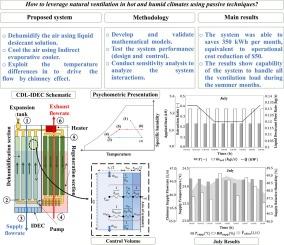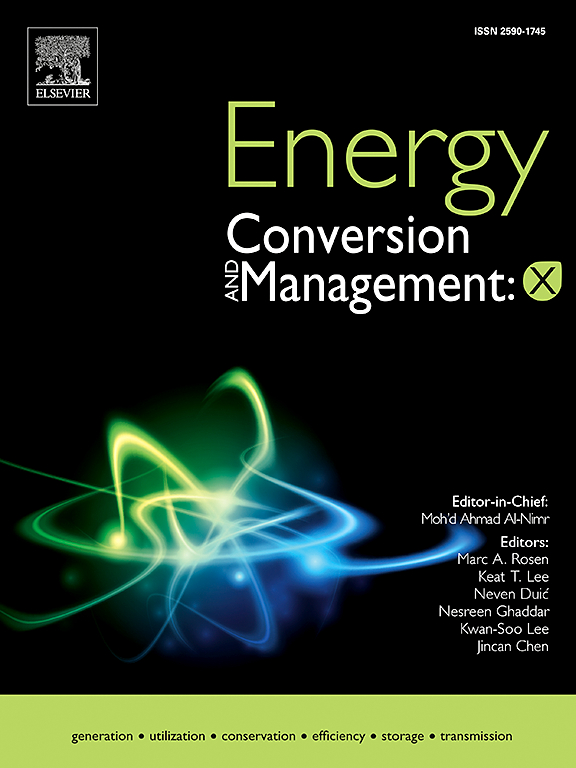烟囱通风、液体干燥剂除湿和蒸发冷却的新型高效节能集成技术,适用于潮湿气候
IF 7.1
Q1 ENERGY & FUELS
引用次数: 0
摘要
在干燥和温和的气候条件下,烟囱效应能有效地驱动被动式建筑通风,为空间引入凉爽的新鲜空气。然而,由于除湿和冷却室外空气所需的能耗较高,它在炎热潮湿气候中的应用受到限制。因此,我们提出了一种新型节能辅助系统,将烟囱驱动通风与液体干燥剂除湿膜循环和间接蒸发冷却整合在一起。该系统利用自然浮力提供通风气流,并通过半透膜使用甲酸钾回路进行有效除湿。其目的是以最低的能耗将室外空气除湿和冷却到 24°C 的室内环境和 40% 至 60% 的相对湿度。开发了数学模型来模拟系统组件内空气和液体干燥剂流动的传热和传质过程。利用先进的机器学习遗传算法模型,对贝鲁特典型办公空间的系统大小和运行情况进行了优化。在夏季,烟囱空气流量在 45 升/秒至 48 升/秒之间,并在目标室内条件下输送。由于无需使用室内冷却系统处理通风空气,该系统在夏季节省了约 350 千瓦时的电能。这相当于夏季处理通风负荷所需的总能量,在案例研究中每月可节省 50 美元。本文章由计算机程序翻译,如有差异,请以英文原文为准。

Novel energy efficient integration of chimney ventilation, liquid desiccant dehumidification, and evaporative cooling for humid climates
The chimney effect for driving passively building ventilation is effective in dry and moderate climates to introduce cool fresh air into the space. However, its application in hot humid climates is limited due to the high energy demands associated with dehumidifying and cooling outdoor air. Thus, a novel energy-efficient assistive system is proposed integrating a chimney-driven ventilation with liquid desiccant dehumidification membrane loop and indirect evaporative cooling. This system leverages natural buoyancy to supply ventilation airflow and uses potassium formate loops through semi-permeable membranes for effective dehumidification. The objective is to dehumidify and cool the induced outdoor air to the room conditions of and relative humidity between and at minimal energy consumption. Mathematical models were developed to simulate the heat and mass transfer processes in the air and liquid desiccant flows within the system components. The system was sized, and its operation was optimized using an advanced machine learning-genetic algorithm model for a typical office space in Beirut. During the summer, the chimney air flowrate ranged from to , and it was delivered at the target room conditions. The system saved around of electrical energy during the summer months due to elimination of the need to treat ventilation air by room cooling system. This was equivalent to the total energy required to handle the ventilation load during the summer season and resulted in a saving of $50/month in the case study.
求助全文
通过发布文献求助,成功后即可免费获取论文全文。
去求助
来源期刊

Energy Conversion and Management-X
Multiple-
CiteScore
8.80
自引率
3.20%
发文量
180
审稿时长
58 days
期刊介绍:
Energy Conversion and Management: X is the open access extension of the reputable journal Energy Conversion and Management, serving as a platform for interdisciplinary research on a wide array of critical energy subjects. The journal is dedicated to publishing original contributions and in-depth technical review articles that present groundbreaking research on topics spanning energy generation, utilization, conversion, storage, transmission, conservation, management, and sustainability.
The scope of Energy Conversion and Management: X encompasses various forms of energy, including mechanical, thermal, nuclear, chemical, electromagnetic, magnetic, and electric energy. It addresses all known energy resources, highlighting both conventional sources like fossil fuels and nuclear power, as well as renewable resources such as solar, biomass, hydro, wind, geothermal, and ocean energy.
 求助内容:
求助内容: 应助结果提醒方式:
应助结果提醒方式:


